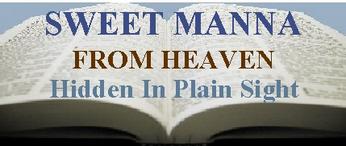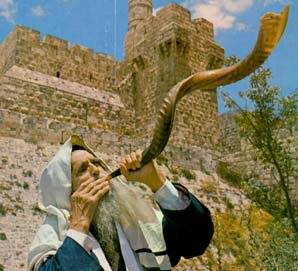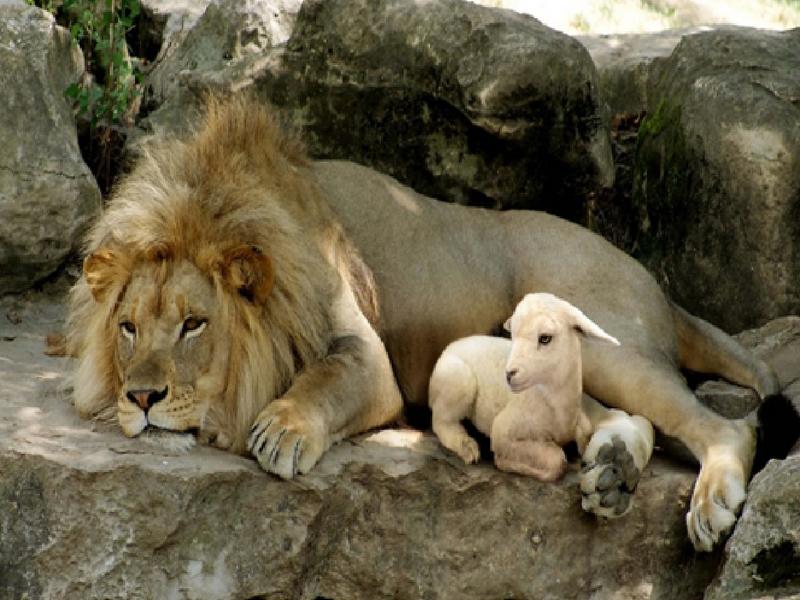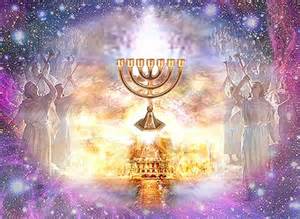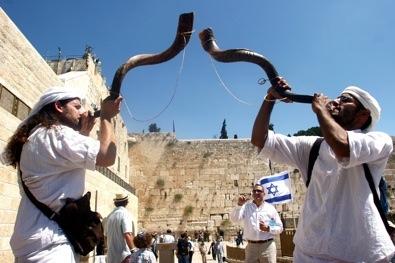Month of Elul
It is interesting to note that the month of Elul is the month that Jews consider to be the month that our God and King draws closes to us. It is said of the month that, “The King is standing in the field.” What that means is that the King has left His palace and has such a desire to be with his people that he has left all of his pomp and circumstance behind to come near to where they are that he loves. He has removed his royal robes to become as one of them. He bids them come, come my beloved let us commune together face to face.
The Jews who have not yet accepted Yeshua as their Jewish Messiah are looking for their King and Messiah in the field at this time of the year. We who know Yeshua recognize that 2,000 years ago, He left his heavenly palace, and left all his heavenly pomp and circumstance of His divinity behind to come to the field of earth to be near those he created and loves. He came to the field of our lives to commune face to face. For 2000 years our King has been plowing the fields of our lives preparing His bride for the wedding of the Messiah and the 1000 year reign.
I’d like to return to the Song of Solomon chapter 6 and dropping down to verse 13, we find here Solomon is crying out for the Shulimite. The book of the Song of Solomon is a prophetic look at Messiah and His Bride.
Solomon who is crying out for the Shulimite is a picture of Yeshua crying out for His Bride Church.
Son 6:13 Return, return, O Shulamite; return, return, that we may look upon thee. What will ye see in the Shulamite? As it were the company of two armies.
Throughout the Hebrew scripture when ever a word is repeated, like it is here with the word return, it is meant to emphasize its importance. The fact that the word return is repeated 4 times in this passage should be a signal for us to pay close attention.
Let’s take a look at this as it pictures Messiah and His Bride. Solomon is crying out to the Shulamite to return. Solomon’s name means prince of peace. Messiah is the Price of Shalom. The Shulamite represents the Bride of the Messiah and Shulamite means daughter of peace. So the picture is that of Messiah who is the Prince of Shalom is crying out to His Bride, who is the Daughter of Shalom. Based on the meaning of the Hebrew and the prophetic picture that is painted in the Song of Solomon of Messiah and His Bride, a deeper understanding could be interpreted like this.
Face me, come back to me, face me, come back to me, My Bride, O Daughter of Shalom, face me, come back to me, face me, come back to me, that we, i.e. Elohim, Abba, Yeshua, and the Ruach HaKodesh along with the angels may look upon thee. What will you see in Your Bride, the Daughter of Shalom? As it were, our gaze is upon a company of dancers, warriors, from Israel and warriors from the Gentiles nations dancing in unity as one man, My Bride, My Daughter of Shalom.
This biblical season of repentance is for 40 days. The first 30 days takes us to the first fall feast of “Trumpets”, or the Wedding of the Messiah, better known as the Jewish New Year, Rosh Hashanah. One of the important messages of these 30 days is that everyone should repent before Rosh HaShanah, because there will be a moment in time when it will be too late to repent. Teshuva continues for 10 more days, these days are known as “The Days of Awe”, and they lead us to “The Day of Atonement, Yom Kippur.” A thorough study of these feasts can found at:
Yeshua has promised that He would have for Himself a glorious Church without spot or wrinkle. Repentance and forgiveness is the spot and wrinkle remover applied to her contrite heart. Elul is a time of refreshing. His Bride will be set apart and sanctified. His blood cleanses us and His word washes us. We are able to be in a continual shower of forgiveness when we embrace teshuva and as the Daughter of Shalom return to our Prince of Shalom and gaze into His beautiful face, as He gazes into Ours. Yeshua has provided everything needed for the Bride to prepare for Her wedding day including the season of Teshuva.
Eph 5:26 That he might sanctify and cleanse it with the washing of water by the word,
Eph 5:27 That he might present it to himself a glorious church, not having spot, or wrinkle, or any such thing; but that it should be holy and without blemish.
Rev 19:7 Let us be glad and rejoice, and give honour to him: for the marriage of the Lamb is come, and his wife hath made herself ready.
I have written an article entitled “His Wife Has Made Herself Ready.” It can be viewed on my website for further study on the subject.
Pray for America!
I exhort therefore, that, first of all, supplications, prayers, intercessions, [and] giving of thanks, be made for all men;
For kings, and for all that are in authority; that we may lead a quiet and peacable life in all godliness and honesty.
For this is good and acceptble in the sight of God our Savior.
Who will have all men to be saved, and to come unto the knowledge of the truth.
For there is one God, and one mediator between God and men, the man Christ Jesus (Yeshua)
1 Timothy 2:1-5
Thank you for reading and be sure to share with friends and family.
If you know of anyone that wants to be on our mailing list. Click Below:
Be Blessed!
Rev. Marjorie
At sundown on August 6th of 2013 began the Biblical month of Elul. The month closes on the eve of September 4th. The Month of Elul is the month of preparation that leads up to the fall feasts. The prophetic fulfillment of the fall feast is yet to be realized. These feasts paint a picture of the rapture, the wedding of the Messiah, the salvation of the nation of Israel, and the second coming of the Messiah.
These events when they are fulfilled will be the quintessential events of God’s love story. History as we know it will climax with the return of the Messiah with His Bride to judge the nations and to set up His millennium Kingdom. Then for a thousand years the King and His Queen will rule and reign in this world with righteousness and love.
Beginning on Rosh Chodesh, which is the beginning of a new noon signifying the start of the month of Elul, and continuing until the day before Rosh Hashanah, also known as the Feast of Trumpets and the Wedding of the Messiah, it is customary to blow the shofar (ram's horn) every day (except for Shabbat). This practice is said to be adopted because it was in the month of Elul when Moses returning for the third time to Mt. Sinai blew the shofar as a reminder to the people to remain faithful and not to fall into sin again, as they did with the golden calf.
The blowing of the shofar every day is intended to awaken us in preparation for the the Lord’s feast days that take place year after year. More importantly though, the blowing of the shofar, is to awaken the Bride Church in preparation for Yeshua’s eminent appearing. The fall feasts are rehearsed prophetically until the final curtain is raised and the Eastern sky parts at His appearing.
The custom is to first blow what is known as tekiah (תְּקִיעָה), a long single blast known as the sound of the King's coronation. This is followed by shevarim (שְׁבָרִים), which is three short, wail-like blasts to signify a call to repentance. The blasts that follow are called teruah (תְּרוּעָה), these blasts are several short blasts of alarm to awaken the bride. The closing shofar is called tekiah hagadol (תְּקִיעָה הַגָּדוֹל), it’s a long, final blast:
The blasts of the shofar speak prophetically about the purpose of the month of Elul.
1. Announces the approaching coronation of the King
2. Signifies a call to repentance
3. Sounds the alarm for the Bride to awaken or arise.
4. Concludes with the Great Trump which is the signal to announce Yom Kippur, the day of atonement,, the day that Israel will be saved in one day.
The letters E-L-U-L is thought to be an acronym for the Hebrew,
"Ani L'dodi V'dodi Li" "I am my beloved's and my beloved is mine”, found in the Song of Solomon.
Son 6:3 I am my beloved's, and my beloved is mine: he feedeth among the lilies.
It is no accident that this sixth month on the biblical calendar, 12th on the civil calendar, paints a picture of love and desire of the Bride and the Bridegroom for one another. There is an order to the biblical calendar. The calendar begins with the spring feasts that painted a picture of Messiah’s first coming as a servant, followed by the counting of the Omar which leads to Pentecost and the outpouring of the Ruach HaKodesh.
Yeshua (Jesus) fulfilled the spring festivals by becoming our sacrificial lamb on Pesach (Passover), the believer’s bread on The Feast of Unleavened Bread, the first fruits among many, on The Festival of First Fruits, (Resurrection day). This festival was the day of his resurrection, three days after Passover began. Then on the Feast of Weeks, or Shavuot, better known to us as Pentecost. He poured out his Holy Spirit, upon the believers in the upper room.
Yeshua fulfilled every spring feast on the exact day that the Lord had instructed for the rehearsals to take place annually. Therefore we can hope that likewise he will do the same on His second coming during the fall feast days. We cannot know the year, but scripture does tell us that we can know the season, that is, the appointed time. A thorough study of the spring feasts can be found at:
The remaining feasts in the fall paint pictures of a Bridegroom and King coming for His Bride and Queen and provides for us glimpses of a Kingdom ruled by Love. As we move into the celebration of the fall feasts the biblical calendar provides 40 days of preparation.
The month of Elul is set aside as a time to return to your first love. Elul is said to mean search. Therefore the Jews consider it a time to search our hearts to see if there be any sin that would separate us from our Beloved.
This period of time for repentance is called Teshuva in Hebrew. Teshuva has a slightly different connotation in Hebrew than repentance does in English. Webster’s 1828 dictionary defines repentance this way: Repentance is a change of mind, or a conversion from sin to God. Repentance is the relinquishment of any practice, from conviction that it has offended God.
Teshuva on the other hand has a sense of restoration because one returns to God. Teshuva has a higher goal of returning face to face with God, rather than just turning ones back on sin. This is the season that represents the Bridegroom calling for His beloved to return to Him and His covenant promises.
Sound the Alarm !!!!!
"Blow you the trumpet in Zion,
and sound an alarm in my holy mountain:
let all the inhabitants of the land tremble:
for the day of the LORD comes,
for it is near at hand" Joel 2:1
Headline: Elul the Time of Preparation for the Bride
Newsletter
August 31, 2013
Visit http://sweetmanna.org
Sweet Manna Ministries
 | ||||||
 | ||||||

